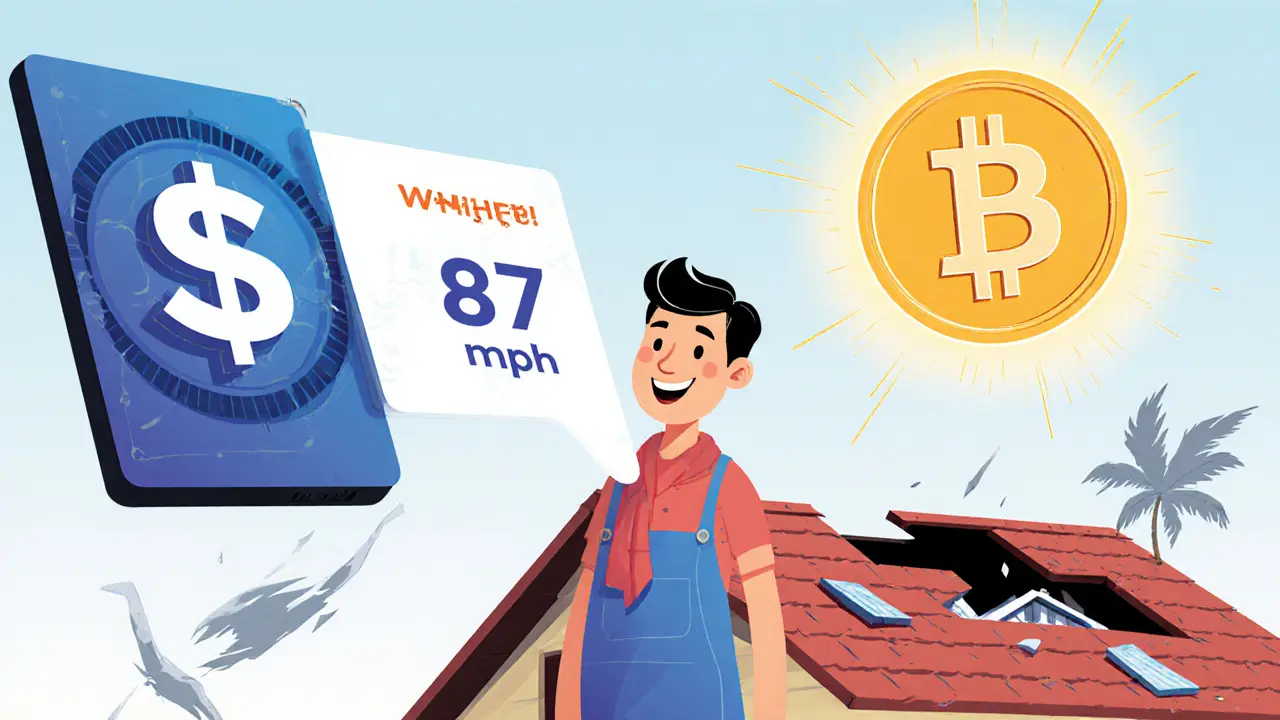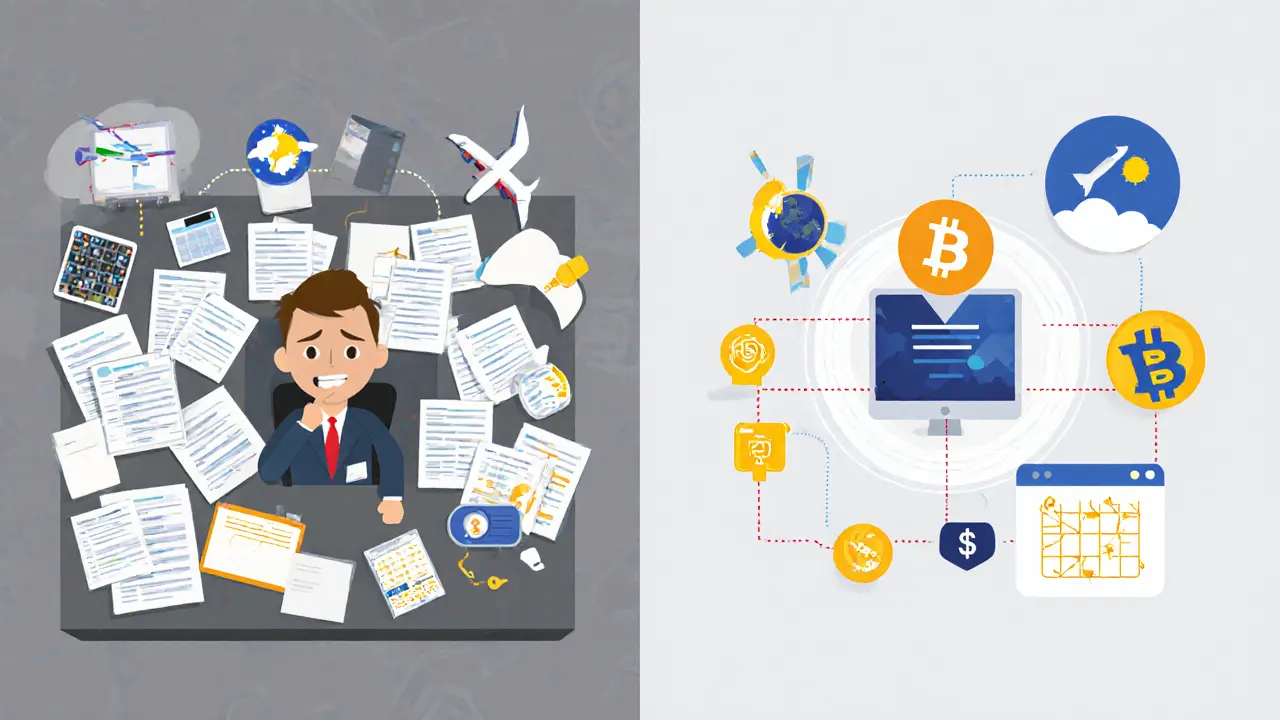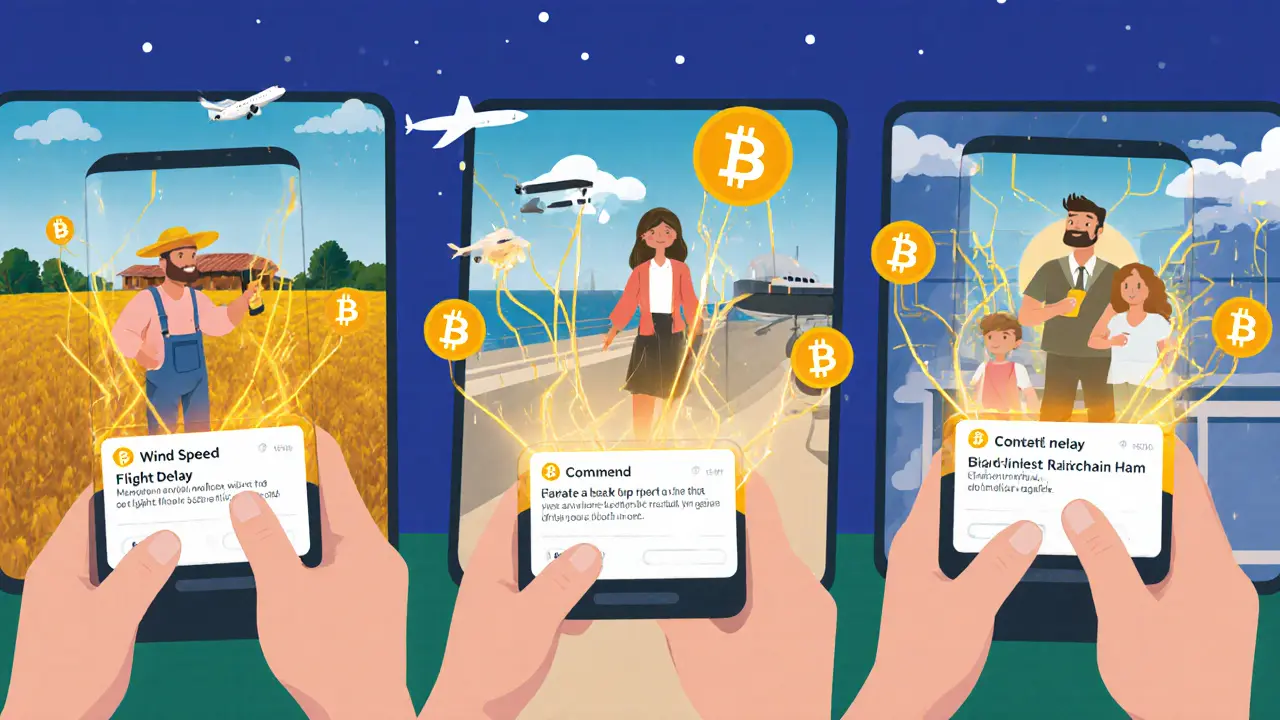Smart Contracts for Automated Claims: How Blockchain Is Rewriting Insurance Payouts
 Jul, 30 2025
Jul, 30 2025
Hurricane Claim Payout Calculator
How It Works
This calculator simulates how parametric hurricane insurance works. If wind speeds reach your policy's threshold (e.g., 85 mph), the smart contract automatically triggers a payout without human intervention.
Imagine filing an insurance claim after a hurricane destroys your roof - and getting paid within two hours. No forms. No calls. No waiting weeks for an adjuster to show up. This isn’t science fiction. It’s happening right now, thanks to smart contracts for automated claims.
Traditional insurance claims are slow. You submit paperwork. The insurer reviews it. Someone checks your policy. Then there’s a delay while they verify the damage, maybe send an adjuster, and finally approve payment. Even for straightforward claims, it can take 30 to 90 days. Smart contracts change that by turning policy terms into code that runs on a blockchain. When conditions are met, money moves automatically.
How Smart Contracts Actually Work in Insurance
A smart contract is just code stored on a blockchain - like Ethereum - that runs when specific conditions are met. In insurance, that code is built to match your policy. If your flight is delayed over two hours, your flight insurance pays out. If your home is in a ZIP code hit by a storm with wind speeds over 80 mph, your parametric home policy triggers a payout.
Here’s how it flows:
- You buy a policy. The terms - like what counts as a qualifying event - are written into the smart contract.
- An event happens. A weather station, satellite, or airline database records the trigger - say, an earthquake of magnitude 6.0 near your home.
- The smart contract checks the data. It pulls the official event data from a trusted source (called an oracle) and compares it to your policy terms.
- If it matches, payment is sent. No human approval needed. The crypto or fiat payout hits your account in minutes.
This removes all the middlemen. No claims adjuster. No back-and-forth emails. No lost paperwork. The system doesn’t guess - it executes.
Why This Is a Game-Changer for Policyholders
For customers, the difference is night and day.
Take a real example: a homeowner in Florida bought parametric storm insurance through a pilot program in 2024. When Hurricane Rafael passed within 15 miles of her home, wind speed sensors recorded sustained gusts of 87 mph. Within 90 minutes, her smart contract verified the event, confirmed her policy’s trigger threshold (85 mph), and sent $10,000 to her bank account. She didn’t file a single form. No photos. No inspection. Just a notification: “Your claim has been paid.”
That’s not an outlier. Reddit users in r/InsurTech have shared similar stories. One person got paid after a hailstorm damaged his car - the claim was triggered by weather data from his insurance partner’s API. Another received funds for a canceled flight because the airline’s delay data was fed directly into the contract.
The speed isn’t just convenient - it’s life-changing. After a disaster, people need cash fast. Paying for temporary housing, replacing essentials, or covering medical bills can’t wait for bureaucratic delays. Smart contracts give people control back.
How Insurers Benefit Too
It’s not just about faster payouts. Insurers save money - a lot of it.
Manual claims processing is expensive. It takes staff, phone lines, offices, and time. Norton Rose Fulbright estimates that automating claims with smart contracts can slash administrative costs by 30% to 50% in eligible lines of business. That’s not theoretical. One European insurer running a pilot on crop insurance reduced its claims handling costs by 42% in six months.
Fraud reduction is another huge win. In traditional systems, up to 10% of claims are estimated to be fraudulent. Smart contracts make fraud harder because:
- Every transaction is recorded on a public, immutable ledger.
- Claims can’t be altered after submission.
- Only verified external data triggers payouts - no one can fake a weather report or flight delay.
That doesn’t mean fraud is impossible - but it’s far harder to pull off. The system doesn’t trust people. It trusts data.

Where It’s Working Right Now (And Where It’s Not)
Smart contracts aren’t ready for every kind of insurance. They work best with clear, measurable events - that’s called parametric insurance.
Current successful use cases:
- Travel insurance: Flight delays, cancellations, lost luggage tracked via airline APIs.
- Weather-based crop insurance: Payouts triggered by rainfall, temperature, or wind data from government meteorological stations.
- Event cancellation insurance: Concerts or festivals get paid if attendance drops below a threshold due to weather or health alerts.
- Property insurance in disaster zones: Homeowners in hurricane or wildfire-prone areas get paid based on real-time seismic or fire detection data.
What doesn’t work yet?
- Health insurance: Medical claims need human judgment - was that injury really from the accident? Was the treatment necessary?
- Life insurance: Death verification is complex. A smart contract can’t confirm someone is dead without a death certificate - and even then, fraud risks remain.
- Auto insurance with physical damage: Determining if a dent was from a collision or a parking lot scrape still needs an adjuster’s eye.
So far, adoption is strongest in property and casualty (P&C) insurance, especially for high-frequency, low-complexity claims. Guidewire reports that several insurers have launched pilots in 2024 - mostly in Asia and Europe - and early results show customer satisfaction scores up 40% compared to traditional claims.
The Hidden Challenges
It’s not all smooth sailing. Smart contracts are only as good as the data they use.
If the weather data source is wrong - say, a sensor malfunctioned - the contract still pays out. That’s called the “oracle problem.” You need reliable, tamper-proof data feeds. Insurance companies are partnering with government agencies and satellite firms to get accurate, third-party data.
Then there’s legal ambiguity. A smart contract might say, “Pay if wind speed exceeds 85 mph.” But what if the wind was 84.9 mph? Who decides if that’s close enough? That’s why every smart contract is backed by a traditional legal contract. The code handles execution. The paper handles interpretation.
Harvard Law School warned in 2018 that the biggest risk isn’t the tech - it’s poorly defined triggers. If the contract says “if the hurricane makes landfall,” but doesn’t define “landfall,” you’ll get lawsuits. Clear definitions matter.
Integration is another hurdle. Most insurers still run on 20-year-old mainframe systems. Connecting those to blockchain networks takes time, money, and skilled developers. That’s why adoption is slow outside of startups and niche insurers.

What’s Next? The Road Ahead
By 2026, experts expect parametric insurance powered by smart contracts to become mainstream in high-risk regions. In places like Southeast Asia and the Caribbean, where traditional insurance is expensive or unavailable, blockchain-based policies are already filling gaps.
Future developments will include:
- Multi-oracle systems: Using data from three different sources to confirm a trigger, reducing error risk.
- Hybrid claims: Simple claims go fully automated; complex ones get flagged for human review.
- Dynamic premiums: Your premium lowers if you live in a low-risk zone - and adjusts automatically based on real-time risk data.
Life insurance may eventually join in - think of a contract that pays out if a person’s biometric data stops registering for 72 hours, verified by a wearable device and hospital records. But that’s still years away.
The real win? Lower premiums. When insurers save on admin and fraud, those savings can go to customers. One pilot in Australia reduced premiums by 18% for parametric home insurance after implementing smart contracts.
Final Thoughts
Smart contracts for automated claims aren’t about replacing people. They’re about removing the friction between a policyholder’s need and the insurer’s ability to respond. They turn insurance from a reactive, paperwork-heavy system into a proactive, real-time safety net.
For the average person, this means peace of mind - knowing that when disaster strikes, help won’t be delayed by bureaucracy. For insurers, it means efficiency, lower costs, and happier customers. And for the industry, it’s the first real step toward a future where insurance isn’t a hassle - it’s invisible, reliable, and instant.
The technology isn’t perfect. But it’s working. And it’s only going to get better.
Can smart contracts really pay out claims without any human involvement?
Yes - but only for claims based on clear, measurable events. If your policy says “pay if wind speed hits 85 mph,” and a trusted weather station records that, the contract pays automatically. But for complex claims - like medical bills or car accidents requiring damage assessment - humans still need to step in. Smart contracts handle the simple, repeatable cases. Humans handle the gray areas.
Are smart contract claims legal?
They are, as long as they’re backed by a traditional legal contract. The smart contract executes the payment, but the legal agreement defines the terms, limits, and dispute resolution. Courts recognize this hybrid model. In 2023, a U.S. district court upheld a smart contract payout after a policyholder challenged the trigger condition - the judge ruled the contract was valid because the terms were clearly written in both code and text.
What happens if the data source is wrong?
That’s a known risk called the “oracle problem.” To prevent this, top insurers use multiple trusted data sources - like government weather stations, satellite imagery, and airline databases - and require at least two to agree before triggering a payout. Some systems even include a human review panel for disputed events. It’s not foolproof, but it’s far more accurate than manual claims processing.
Can I buy smart contract insurance today?
Yes - but only in limited forms. Companies like Etherisc and Arbol offer parametric flight delay, crop, and weather insurance online. Some traditional insurers, like Allianz and AXA, have pilot programs for travel and property insurance. You won’t find it in every policy yet, but if you live in a hurricane-prone area or travel frequently, you can already opt in.
Will smart contracts replace insurance agents?
Not entirely. Agents will shift from processing claims to advising clients on which policies to buy, helping them understand trigger conditions, and handling complex cases. In fact, agents who understand smart contracts are becoming more valuable - they can explain how automated payouts work and help clients choose the right coverage. The role is changing, not disappearing.
Lani Manalansan
November 21, 2025 AT 04:54My aunt in Florida got paid $12k in 90 minutes after a storm wiped out her roof. No photos, no adjuster, no waiting. She just got a text: 'Claim paid.' I cried. This isn’t just tech-it’s dignity.
People act like this is sci-fi, but it’s already saving lives. When you’re sleeping in a car because your house is gone, waiting 60 days for a check isn’t bureaucracy-it’s cruelty.
Frank Verhelst
November 21, 2025 AT 04:55OMG YES 🙌 I bought parametric flight insurance last month and my plane got delayed 3hrs-paid out in 11 minutes. No form. No email. Just a notification and $200 in my wallet. 😭
Why are we still doing this the old way?? This should be standard. Insurance shouldn’t feel like a hostage situation.
Roshan Varghese
November 21, 2025 AT 09:23lol u guys are so gullible. blockchain? smart contracts? 🤡
they're just using weather data to scam people. those 'trusted oracles' are owned by big insurers. they tweak the numbers, pay out when they wanna, and blame 'sensor errors' when they don't.
and dont get me started on how they're gonna track your biometrics for life insurance... they're building a surveillance state under the guise of 'efficiency'.
also 'parametric insurance' is just a fancy word for 'we don't care if you actually lost anything'.
Dexter Guarujá
November 21, 2025 AT 23:50Let’s be real-this only works because America and Europe have the infrastructure to support it. In the rest of the world? They’re still using fax machines. You think a farmer in Bihar is getting paid by satellite data? 😂
And don’t even get me started on how this tech is being weaponized by Silicon Valley to replace human jobs under the guise of ‘innovation.’
Smart contracts? More like ‘smart exploitation.’ Real insurance isn’t about code-it’s about trust, and trust can’t be coded by some 22-year-old in SF who’s never seen a flooded house.
Also, why is everyone acting like this is new? We’ve had automated claims in Germany since 2019. We didn’t need a crypto hype cycle to figure it out.
Jennifer Corley
November 23, 2025 AT 13:10Interesting. But let’s not pretend this eliminates fraud. The real issue is data manipulation. If a weather station in Texas is hacked to show 86 mph winds when it was 83, the contract pays out anyway. And who’s liable? The insurer? The data provider? The blockchain developer?
And what about bias in the data? If your ZIP code has fewer sensors, you’re less likely to get paid-even if you’re hit harder. That’s not efficiency. That’s algorithmic redlining.
Also, the ‘hybrid model’ is just a band-aid. If the code says ‘pay’ and the legal contract says ‘deny,’ who wins? The judge? The code? The company’s lawyers?
This isn’t progress. It’s a liability minefield with a shiny UI.